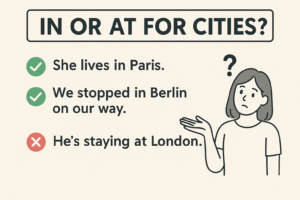Is It Correct to Use “At” for Cities?-Grammar Puzzle Solved (9)
English learners often ask, “Is it grammatically correct to use ‘at’ for cities?” This is a common point of confusion, especially for those whose native languages use prepositions differently. Prepositions like “at,” “in,” and “on” often create grammar puzzles for learners. So, let’s clear it up.
The short answer is: no, we generally do not use “at” for cities in standard English. Instead, we say someone is “in” a city, not “at” a city. For example:
-
✅ “She lives in Paris.”
-
✅ “We stopped in Berlin on our way.”
-
❌ “He’s staying at London.”
The correct preposition is “in” when referring to cities, countries, and other large areas. This is because “in” implies being inside a defined space. A city is considered a large, general area, so “in” fits best.
However, we do use “at” for specific locations inside a city. For example:
-
“She’s at the station in New York.”
-
“He’s at the hotel in Rome.”
In these examples, the city is the larger place (requiring “in”), while the specific point within it (station, hotel) uses “at.” So, if you’re ever wondering “Is it grammatically correct to use ‘at’ for cities?” — the answer is no, unless you’re referring to a specific place located within the city.
Using “at” for cities might appear in casual speech or regional dialects, but it sounds ungrammatical in formal English. Stick with “in” when talking about being in a city, and your English will sound more natural.
In conclusion, remember this simple rule: use “in” for cities, use “at” for specific places. Mastering prepositions can take time, but this small change will make a big difference in how fluent and accurate you sound.

The Monk in The Canterbury Tales: https://englishlitnotes.com/2025/05/24/monk-in-canterbury-tales/
China’s Way to Progress: https://englishwithnaeemullahbutt.com/2025/06/03/chinas-way-to-progress/
Walt Whitman- Voice of American Democracy:
https://americanlit.englishlitnotes.com/walt-whitman-voice-of-american-democracy/
Who vs whom: https://grammarpuzzlesolved.englishlitnotes.com/who-vs-whom/
Visit ChatGPT to explore the platform and interact with the AI: https://chat.openai.com
Discover more from Grammar Puzzle Solved by Naeem Ullah Butt
Subscribe to get the latest posts sent to your email.